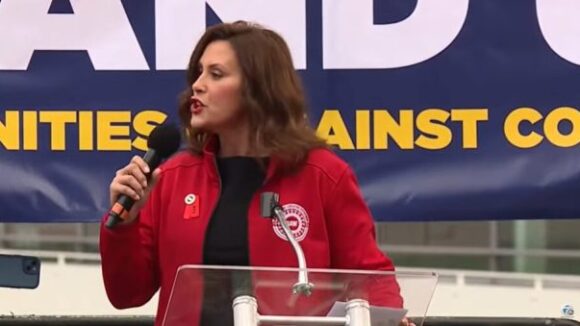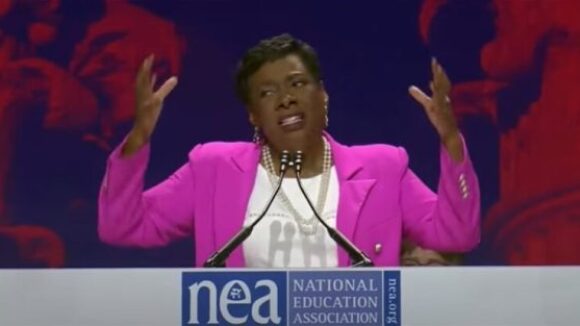Tyranny Triumphs in the Great Lakes State
Ignoring ample evidence of forced unionism’s unfairness and its damaging impact on jobs and incomes, Big Labor Michigan Gov. Gretchen Whitmer signed Right to Work destruction in 2023.

Big Labor Notice: Maintain ‘Code of Silence,’ or Be Blacklisted
For eight-and-a-half decades now, federal law has accorded a relative handful of union officials monopoly power to deal with employers on workplace issues affecting millions of employees. Employees who disagree with union bosses’ positions on such matters are barred from dealing directly with the employer.
Big Labor politicians and other apologists for this regime claim it is for employees’ “own good.” But ample experience shows this just isn’t so.
A recent case in point concerns Joseph Stasko, an employee at the Bemis Company bread-bag manufacturing facility located in West Hazelton, Pa.
Several years ago, Mr. Stasko fell afoul of a vindictive coworker, Dominic DeSpirito, who also happens to be president of Local 735-S of the International Brotherhood of Teamsters.
Mr. DeSpirito evidently believed his position as the top officer of the union local, wielding monopoly-bargaining power over roughly 350 Bemis production employees in West Hazelton, entitled him to harass his fellow employees verbally with impunity.
In mid-December 2017, after witnessing Mr. DeSpirito abuse Mr. Stasko again and again over the course of roughly three months, another employee at the company, Michael Samsel, submitted a statement to Bemis regarding the Teamster kingpin’s recurrent gross violations of workplace rules.
Mr. DeSpirito was immediately suspended. After investigating the alleged misconduct for several weeks, Bemis determined Mr. Samsel’s statement was substantively accurate and fired Mr. DeSpirito. But the trouble was just beginning for the independent-minded employees who had stood up to him.
‘They Were Leaving a Fake Rat, Like Homemade Paper Rats Around the Work Area’
As he later testified to the National Labor Relations Board (NLRB), Mr. Samsel began finding items surreptitiously left at his press:
“They were leaving notes. They were leaving a fake rat, like homemade paper rats around the work area.”
When Mr. Samsel complained about the ugly messages he was being sent, Local 735-S Vice President Kevin Davidovich allegedly warned him “it’s going to get worse,” because “Dominic” had told him to “go after the rats.”
Around the same time, 735-S Secretary-Treasurer Lynn Andrews allegedly approached Mr. Stasko in the breakroom and began yelling at him, “How could we do this to Dominic?”
Subsequently, Ms. Andrews posted on the union bulletin board, located at the breakroom entrance, a memo stating, in part: “Turning in fellow Union members is a violation of the Union by laws and could result in fines and black listed [sic] from all union jobs.”
After blatantly threatening employees like Mr. Stasko with loss of employment for truthfully communicating to Bemis about Boss DeSpirito’s persistent ugly disruptions of the workplace, Ms. Andrews repeatedly pressured Bemis to discipline Mr. Stasko for two minor safety infractions.
As the NLRB ultimately concluded, Bemis routinely handled such isolated infractions by counseling employees rather than disciplining them, and Ms. Andrews’ attempts to cause Mr. Stasko to be disciplined were clearly a means to punish him for activity protected by federal law.
Committee Fights to Bar Union Monopoly Bargaining As Well as Forced Dues
National Right to Work Committee Vice President John Kalb commented:
“Because Joseph Stasko and Michael Samsel refused to be intimidated, Local 735-S bosses were finally found by the NLRB to have violated federal labor law.
“Unfortunately, union bosses often get away with exploiting their monopoly-bargaining privileges to bully and intimidate independent-minded workers.
“That’s one reason why Right to Work’s legislative program is committed to repealing all special-interest laws that grant union bosses ‘exclusive’ power to communicate with the employer over workplace matters as well as laws that authorize forced union dues and fees.
“Just this March, for example, the Committee successfully lobbied on behalf of its South Dakota members for passage of S.B.147, a law that shields faculty and other employees of state universities and branch campuses from Big Labor domination.
“Of course, S.B.147 is just the beginning. Right to Work supporters are pressing for the protection, in the near future, of all South Dakota public employees from union monopoly bargaining.”

Ignoring ample evidence of forced unionism’s unfairness and its damaging impact on jobs and incomes, Big Labor Michigan Gov. Gretchen Whitmer signed Right to Work destruction in 2023.

Largely thanks to the Right to Work attorney-won U.S. Supreme Court decision in Janus v. AFSCME, union bosses like NEA President Becky Pringle are no longer able to block virtually all meaningful education policy reforms.

Avelo employee Kim Howard believes all the firm’s flight attendants should get to vote on continued AFA rule. Credit: WTNH-TV (ABC,…